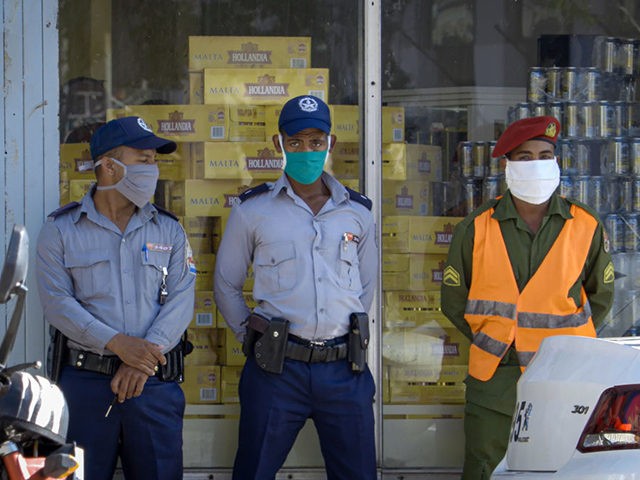The global NGO Human Rights Watch accused the communist government of Cuba on Monday of abusing Chinese coronavirus guidelines to persecute, imprison, and silence pro-democracy dissidents.
The Castro regime was late to adopt precautions to protect citizens from the pandemic, initially attempting to take advantage of the diminished competition for tourist dollars due to global travel restrictions by inviting international tourists. In March, while defying public health experts and inviting increased travel, Communist Party officials also refused to shut down schools, demanding that impoverished parents send children to school with soap and water at the parents’ expense. Nationwide outrage at the regime resulted in the Castro regime ultimately implementing mask and social distance requirements.
Police have used these requirements, Human Rights Watch revealed on Monday, to imprison pro-democracy dissidents, harassing them with dubious claims of violating social distancing measures or wearing masks incorrectly. The most high-profile example of this abuse occurred on the night of Thanksgiving, November 26, when Cuban regime agents stormed the home of dissident Luis Manuel Otero Alcántara, the head of the San Isidro Movement. The group is an artistic collective demanding the end of communism on the island. At the time of the raid, several group members were staying with Otero and engaging in a hunger strike demanding the release of rapper Denis Solís, a member of the San Isidro movement, from prison. Solís was sentenced to eight months in prison for not allowing a police officer to enter his home illegally without a warrant.
Cuban police raided the home claiming that one of the members of San Isidro had violated Chinese coronavirus precautions by traveling to the United States and not taking a coronavirus test upon returning. Those inside said that the state security agents entering the home were dressed in lab coats, presumably to identify them as doctors.
“A battalion came in of supposed ‘doctors,’ people with physical preparation; they were gorillas disguised as doctors, to direct us all. It was not a pleasant appearance,” Yasser Castellanos, one of the dissidents involved in the incident, said during a Facebook live broadcast following the attack. “They wanted to get us out of here by any means necessary.”
The raid prompted an unprecedented protest in front of the Cuban Ministry of Culture that weekend that attracted as many as 300 artists, demanding the regime respect the rights of the San Isidro members. Police responded by using a toxic gas agent, which witnesses said was either tear gas or pepper spray, to disperse the crowd.
“Cuban authorities have taken advantage of the norms against COVID-19 [Chinese coronavirus] to expand to the long list of repressive tools it uses against its critics,” José Miguel Vivanco, Americas director for Human Rights Watch, said on Monday. “This is part of a wider pattern in which the government shamelessly uses any excuse to repress dissent systematically.”
Including the San Isidro arrests, Human Rights Watch identified 34 victims in the country of coronavirus-related police abuse.
“30 of the victims were detained, harassed, fined, or threatens with the possibility of criminal charges for allegedly violating norms related to COVID-19;” Human Rights Watch detailed, “among those, nine were accused of not wearing a mask … correctly. Another two were threatened with criminal persecution for ‘propagation of epidemics’ do to disseminating information on COVID-19 cases on the island.”
The crime “propagation of epidemics” is punishable by up to nine months in prison.
In other cases, the NGO added, Cuban state security agents accused dissidents of violating coronavirus norms without ever specifying any provisions the Cuban regime has actually implemented to ostensibly prevent the spread of the virus. In one of the more egregious cases identified by the organization, one dissident was forced to pay a fine for not telling a friend to fix his or her mask, which was allegedly incorrectly covering their face. There is no Cuban legal provision mandating that one correct the mask usage of “friends” or any fine on the record associated with that non-infraction.
In yet more cases, police did not bother to offer any explanation at all for what the alleged violator did wrong.
Some persecuted using the pandemic as an excuse “suffered violent beatings,” Human Rights Watch highlighted.
Among the cases that apparently resulted in the most violence is that of Keilylli de la Mora Valle, a member of the dissident group the Patriotic Union of Cuba (UNPACU). De la Mora Valle was arrested on April 12 for allegedly incorrectly wearing a mask while smoking a cigarette.
“At the police station, de la Mora Valle began to take her clothes off as a form of protest,” Human Rights Watch relayed. “A police officer grabbed her by the neck, took her to a cell, and began kicking her thighs and knees.”
De la Mora Valle was sentenced to a year and a half in prison at a trial where the government did not allow her to have a lawyer. She was convicted of “disrespect,” “resistance,” “disobedience,” and “propagation of epidemics.”
Prior to her conviction, the dissident posted photos of her bruises from the initial beating at the police station on her Facebook account.
Hermanos aquí les voy a poner las fotos de los golpes y la del policía que los dió#Lacasanoescalabozo
Posted by Keilylli De La Mora Valle on Tuesday, April 14, 2020
Cuba is experiencing a surge in Chinese coronavirus cases nationwide. The nation documented 124 cases on Monday, the highest number in a single day since the pandemic started. As of Tuesday, the island has documented 8,906 cases nationwide and 136 deaths attributed to the virus.

COMMENTS
Please let us know if you're having issues with commenting.